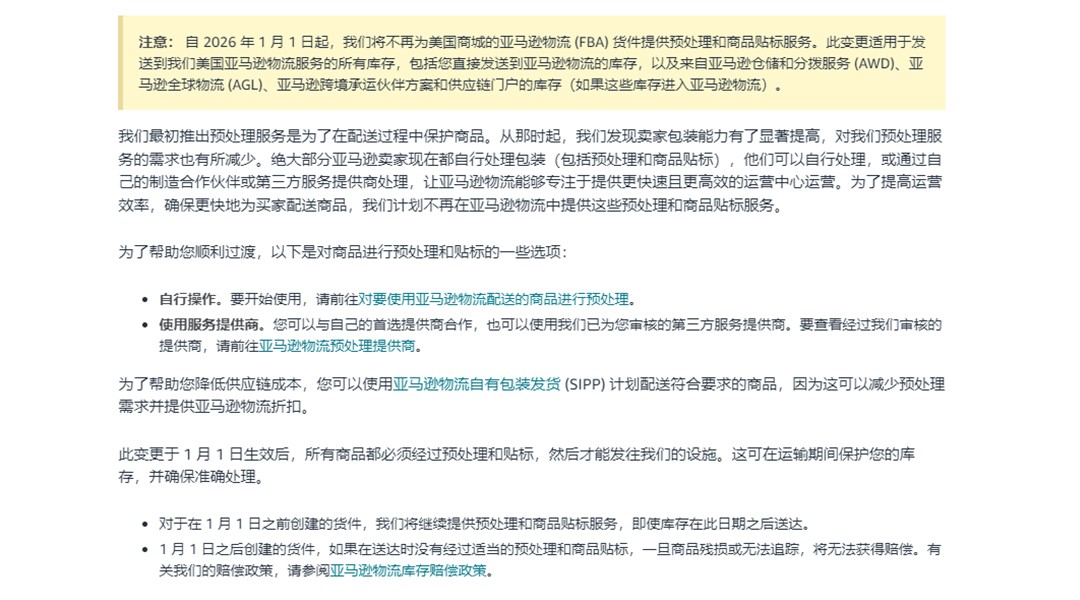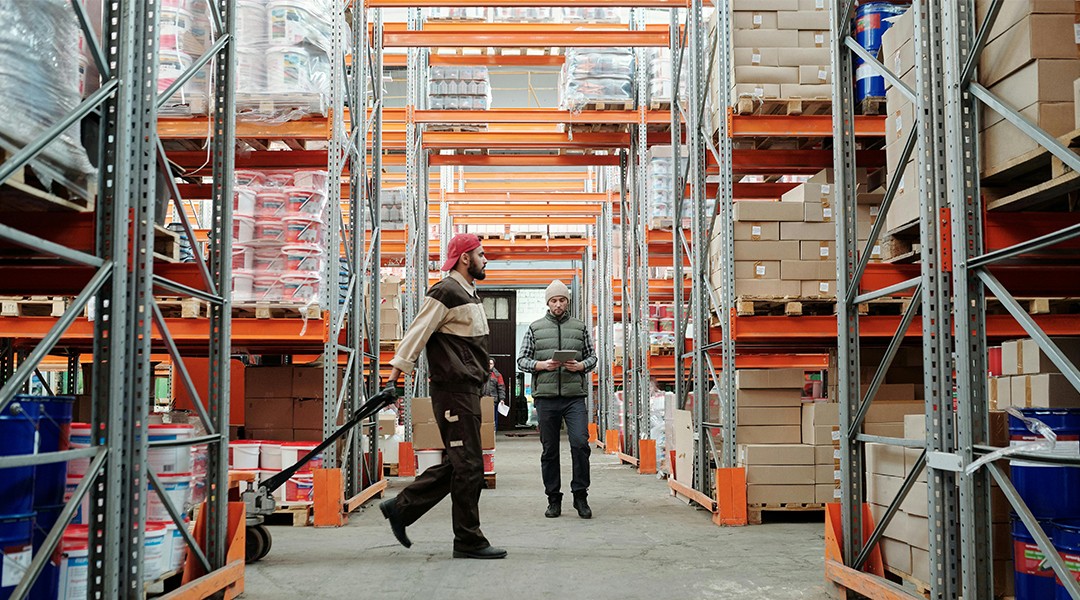
아마존이 2025년 7월 28일 2026년 1월 1일부로 FBA 사전 준비 및 라벨링 서비스를 완전히 종료한다고 발표했을 때, 미국 판매자 커뮤니티 내에서 뚜렷한 양극화 현상이 나타났습니다: 한 그룹은 긴급하게 대안을 모색한 반면, 다른 그룹은 지켜보기로 한 접근 방식을 취했습니다. 표면상 "판매자들의 향상된 자체 포장 능력"에 의해 추진된 이 서비스 조정은 공급망의 권력 구조에 더 깊은 변혁을 촉발하고 있습니다.
 The
The
사라지는 라벨링 기계와 중소 판매자들의 고난
켄터키에 위치한 아마존 물류 센터에서는 판매자들에게 편의를 제공하던 라벨링 장비가 점차 운용 중단되고 있습니다. 공식 설명은 "대다수의 판매자들이 현재 자체적으로 또는 제3자를 통해 포장 및 라벨링을 완료하고 있습니다"라고 밝히고 있습니다. 그러나 자체 창고가 없는 중소 규모 판매자들에게 이러한 변화는 공급망에 대한 지진과 같습니다. 한 판매자는 포럼에서 직설적으로 "자체 창고가 없어 아마존의 사전 준비 서비스에 전적으로 의존하고 있습니다. 이 새로운 정책은 우리를 파산시킬 것입니다!"라고 말했습니다. 실제 데이터는 심각한 도전 과제를 보여주고 있습니다:
비용 부담: 제3자 라벨링 비용이 아마존 기존 서비스보다 개당 0.1−0.3 더 높아, 연간 수백만 달러 매출 판매자에게는 수만 달러의 추가 지출이 발생합니다.
시한 부족: 판매자들은 포장 공정을 재구성하기 위해 단 5개월의 시간만 주어져 인력 구성이 주요 난관으로 대두됩니다.
위험 증가: 2026년 이후 운송 중 손상된 규정 미준수 상품은 보상 대상에서 제외되며, 위반 상품은 즉시 폐기 처분됩니다.
로스앤젤레스 크로스보더 전자상거래 협회의 관찰에 따르면, 많은 중소 판매자들은 아마존의 포장 규격을 완전히 읽어본 적이 없으며, 이전에는 플랫폼의 서비스를 통해 포장 결함을 '보완'해 왔습니다. 이와 같은 소극적 규정 준수 모델은 새 정책 아래에서는 지속 불가능할 것입니다.

공인 서비스 제공업체와 물류 환경의 재편
아마존 정책 발표에서 강조된 대체 솔루션인 제3자 공인 서비스 제공업체는 빠르게 시장의 초점이 되고 있습니다. 비록 그들의 견적이 아마존의 기존 서비스보다 높지만, 아마존의 엄격한 심사를 통과한 이러한 제공업체에 대한 수요는 급증하고 있습니다. 동시에, 해외 창고 서비스는 새로운 기회를 맞이하고 있습니다:
운송 가치 부각: 중국 판매자들은 상품을 먼저 미국 제3자 해외 창고로 발송하여 재라벨링 및 사전 준비를 거친 후 FBA 창고로 이관할 수 있습니다.
서비스 다각화: 라벨링 외에도 해외 창고는 장기 저장, 제품 검수, 재고 정리 등의 부가 서비스를 제공할 수 있습니다.
아마존 글로벌 물류(AGL) 채널 도입이 발표 이후 뚜렷하게 증가했습니다. 플랫폼의 물류 채널이 포장 규정 준수에 대해 더 관대한 태도를 보이기 때문입니다. 이는 Box-Level 재고 배포와 같은 새로운 서비스와 시너지 효과를 발휘하며 아마존의 전체 물류 체인에 대한 통제력을 강화하고 있습니다.
제6항:
혁신적 돌파: 포장 디자인에서 협력 모델까지
비용 압박에 직면한 선두 판매자들은 다차원적 대응을 펼치고 있습니다:
제품-포장 일체화: 아마존의 SIPP(제품 포장 내 발송) 모델 채택으로 원공장 포장 설계를 통한 사전 준비 필요성을 줄입니다. 성공 사례는 이 방식이 포장 비용을 5% 절감할 뿐만 아니라 FBA 운송 할인 자격도 부여받을 수 있음을 보여줍니다.
공유 경제 모델: 중소 판매자들이 공동으로 창고를 임대하고 장비 투자를 공유하여 전환 비용을 크게 낮춥니다. 한 가정용품 판매자는 이 모델을 통해 장비 투자액을 120,000에서35,000로, 인건비를 40% 줄였습니다.
공정 디지털화: 물류 추적 도구 활용으로 선적 현황을 엄격히 모니터링하여 아마존의 단축된 평가 주기에 대응합니다. 제품 크기와 무게를 정확히 신고하여 불일치로 인한 계정 제한을 피합니다.

체계 재편: 아마존의 물류 콤비네이션 펀치
라벨링 서비스 종료는 단독 사건이 아닌, 아마존의 더 광범위한 물류 체계 개혁의 일환입니다:
크기 완화: 2025년 6월부터 최대 외부 박스 크기가 36인치로 확대되어 대형 품목 운송이 용이해졌습니다.
일정 강화: 7월 31일 발효된 새로운 운송 정책으로 평가 주기가 30일에서 7일로 단축되어 최근 실적에 더 집중합니다.
분할 선적 최적화: "선적 분할 최적화" 모델은 판매자가 표준화된 운송 방식을 채택하도록 유도합니다.
이러한 정책들은 공동으로 한 가지 목표를 추구합니다: 이행 효율성을 새로운 수준으로 끌어올리는 것입니다. 아마존이 마지막 라벨링 기계를 철거하면서, 단순히 장비뿐만 아니라 비핵심 운영에 대한 책임도 함께 제거하고 있습니다 - 이러한 비용과 위험을 공급망 상류로 전가하는 것입니다.
새로운 균형 찾기
비용 증가와 공정 변화에 직면하여, 규모가 다른 판매자들은 차별화된 전략을 채택하고 있습니다. 일부 중형 판매자들은 자체 또는 반자체 사전 준비 능력 구축에 투자하여 외부 서비스 의존도를 낮추고 장기적 비용을 통제하려 합니다. 한편 많은 중소 판매자들은 제3자 해외 창고 서비스를 활용하거나 수직 카테고리 커뮤니티에 가입하여 서비스 제공업체 자원을 공유하고 비용을 분할하는 방향으로 기울고 있습니다.
이 플랫폼 주도의 물류 체계 재편은 업계의 경쟁 규칙을 바꾸고 있습니다. 규정 준수 압력을 포장 및 공정 혁신의 동력으로 전환하는 능력이 2026년 이후 판매자 경쟁력을 결정하는 핵심 요소로 부상하고 있습니다. 6개월의 전환 기간이 진행됨에 따라, 판매자들이 내려야 할 결정은 '라벨을 어떻게 올바르게 부착할 것인가'라는 운영적 수준을 넘어 공급망 통제와 비용 구조에 대한 재평가까지 포함되게 되었습니다.

© 2015-2026 심천시일구팔일과학기술유한회사 | 모든 권리 보유